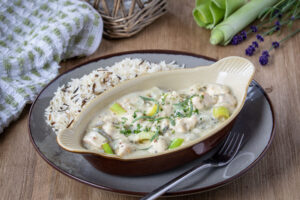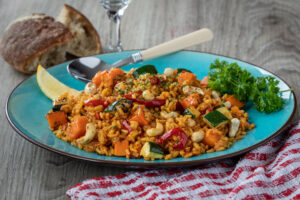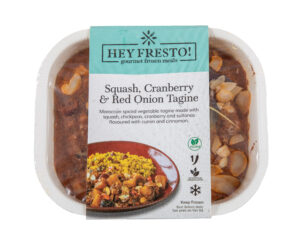Contents
- FISH PIE WITH SMOKED APPLEWOOD MASH
- BLACK BEAN & BUTTERNUT SQUASH CHILLI
- CHICKEN & LEEK IN A CREAMY TARRAGON SAUCE
- VEGETABLE PAELLA WITH CASHEW NUTS
- MUSHROOM RAMEN
- CHICKEN ACHARI
- SQUASH, CRANBERRY & ROASTED ONION TAGINE
Every three minutes in the UK, one person dies from a heart or circulatory disease – that’s more than 160,000 deaths in a year according to the British Heart Foundation.
Cardiovascular disease (CVD) is one of the biggest killers globally and poses a greater threat to individuals as they age.
One of the most common causes of this condition is a build up of fat deposits from cholesterol in the artery walls and blood vessels over time.
Gloomy as this is to read, it is important to understand so you know how to decrease your risk of developing CVD.
Cutting down on the amount of saturated fats you consume is one of the best ways of keeping your heart healthy as you get older; doing so reduces the amount of low-density lipoprotein, aka bad cholesterol, building up in the bloodstream.
Normally, receptor cells in the liver will remove this cholesterol from the blood to be broken down.
However, if a person is consuming too much saturated fat from their diet, these cells will not function as well, leading to a buildup of cholesterol.
But taking care of your cardiovascular health does not have to mean hours of trawling the internet for healthy recipes and afternoons spent in the kitchen.
In fact, it is as easy as our heart-healthy meals below.
Meals to boost the longevity of your heart and health
FISH PIE WITH SMOKED APPLEWOOD MASH
Fish is an incredibly rich source of omega-3 – a sentence you will have heard many times but perhaps do not know the meaning of.
In a nutshell, omega-3 fatty acids are a type of unsaturated fatty acids which contribute to the protection of your heart and blood vessels from disease.
They come in 3 forms:
- Alpha-linolenic acid (AHA) – Not made by our bodies and essential for our health, AHA is mainly found in seeds, vegetable oils and nuts.
- Eicosapentaenoic acid (EPA) – Helping to reduce blood clots and inflammation, EPA is found in cold water fish and fish oil.
- Docosahexaenoic acid (DHA) – This fatty acid is also found in fish, fish oil or algae oil and is essential for the healthy functioning of the brain, skin and eyes.
Omega-3 fatty acids facilitate improved cardiovascular health by lowering fat (triglycerides) entering the blood after food consumption, improving circulation, preventing blood clots, lowering blood pressure and maintaining a steady heart rhythm.
Made with quality produce, our fish pie is high in omega-3 and partners deliciously with boiled new potatoes, crushed and combined with fresh dill and pepper.
BLACK BEAN & BUTTERNUT SQUASH CHILLI
Pulses are probably one of the most nutritious and cheapest foods out there. We cannot recommend them enough.
As a fabulous substitute for meat, pulses such as black beans and lentils are loaded with protein and fibre and reinforce heart strength by controlling your blood cholesterol.
Did we also mention that pulses are so much better for the environment than meat?
They don’t require much water or fertiliser and their cultivation even enriches the soil for other crops.
If you’re stuck for something to cook which includes pulses, we recommend you try our black bean chilli, served with a side of rice and a little tzatziki.
CHICKEN & LEEK IN A CREAMY TARRAGON SAUCE
Cooked right, chicken is a lean source of protein which does not skyrocket your fat consumption. (We do advise that you avoid processed chicken which has been linked to heart disease and cancers).
Vastly versatile, chicken is brilliant to add to any meal from salads to pies to stews.
To double the goodness, we have also included leeks in the above dish, a viridescent veggie with a wealth of health.
Beneficial for the wellbeing of your eyes and strong healthy bones, leeks contain an antioxidant called kaempferol which has been linked to protecting the heart from age-related diseases.
VEGETABLE PAELLA WITH CASHEW NUTS
If you want to maintain a young heart, Mediterranean food might just be the way to achieve it.
Based largely on vegetables, fresh fish, herbs and healthy oils, Mediterranean dishes are mouth-watering and heart-strengthening in equal measure.
Including plenty of smoky roasted vegetables, our cashew nut paella takes inspiration from this cuisine.
Additionally, this moreish meal is low in saturated fats but high in healthy unsaturated fats from the cashews which have been indicated in some studies to lower the risk of heart disease.
MUSHROOM RAMEN
Bursting with umami, mushroom ramen is a sensational dish and not just for its flavour.
Due to being packed full of potassium, mushrooms are a natural regulator of blood pressure alongside their extensive nutritional value which includes:
- High protein
- Essential amino acids
- Fibre
- Vitamins B1, B2, B12, C, and D
- The following minerals: Calcium, potassium, magnesium, sodium, phosphorus, copper, iron, manganese, sodium and selenium.
The beauty of ramen is its versatility – you can add pretty much any ingredients you want to diversify this dish!
In our recipe, we include edamame beans (immature soybeans) which are high in protein and have been shown to lower heart cholesterol.
CHICKEN ACHARI
Due to the inclusion of ghee (clarified butter) and coconut milk which both contain large amounts of saturated fats, Indian food is not notorious for its contribution to heart health.
Raising your LDL cholesterol, a large consumption of ghee can contribute to a heightened risk of heart disease and stroke.
But what if we told you that you could enjoy this cuisine’s flavours without the worry of cholesterol accumulating in your system?
Made with a very small amount of ghee and largely based on vegetables, chickpeas, chilli and tomatoes, our chicken achari is savoury, succulent and scrumptious.
Served up with jasmine rice or naan, this chicken dinner is a winner.
SQUASH, CRANBERRY & ROASTED ONION TAGINE
Similar to mushrooms, squash is high in potassium meaning it can help maintain a healthy blood pressure.
Technically a fruit and not a veggie, squash is full of carotenoids which have been shown to reduce the risk of developing heart problems in later life.
Alongside this, squash’s fibrous nature has been indicated to a decrease in the likelihood of developing bowel cancer and type 2 diabetes.
Infused with a fruity Moroccan flavour, our squash tagine is an enviable meal which does your insides a whole lot of good.







